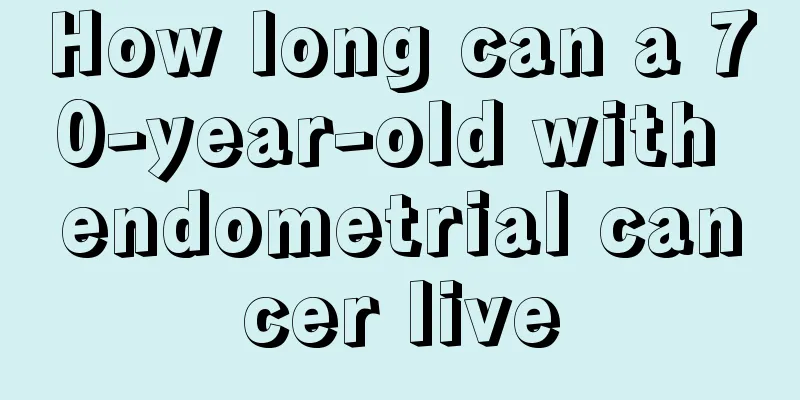How long can a 70-year-old with endometrial cancer live

|
The survival of a 70-year-old endometrial cancer patient depends on the cancer stage, treatment method and physical condition. Early detection and active treatment can significantly prolong the survival period. Treatment options include surgery, radiotherapy, chemotherapy and targeted therapy. The 5-year survival rate of early-stage patients can reach more than 90%. 1. Surgical treatment: Surgery is the main treatment for endometrial cancer. Patients in the early stage usually undergo a total hysterectomy, including the removal of the uterus, fallopian tubes, and ovaries. For patients in the advanced stage, lymph node dissection may be required to completely remove cancer cells. The postoperative recovery period is about 4-6 weeks, and care should be taken to avoid strenuous exercise and infection. 2. Radiotherapy: Radiotherapy is often used as an adjuvant therapy after surgery to reduce the risk of recurrence. External radiation therapy kills cancer cells through high-energy rays, while internal radiation therapy places the radiation source directly into the uterine cavity. Side effects such as fatigue and skin reactions may occur during radiotherapy, and regular review and adjustment of the treatment plan are required. 3. Chemotherapy: Chemotherapy is suitable for advanced or recurrent endometrial cancer. Commonly used drugs include paclitaxel, carboplatin and doxorubicin. The chemotherapy cycle is usually 3-6 courses, with an interval of 3-4 weeks between each course. During chemotherapy, blood routine and liver and kidney function should be closely monitored to prevent infection and bleeding. 4. Targeted therapy: Targeted drugs such as bevacizumab and pembrolizumab inhibit tumor growth by specifically acting on molecular targets on cancer cells. Targeted therapy has relatively few side effects, but the cost is high, and it needs to be selected according to the patient's financial situation and condition. 5. Nutritional support: Patients need to maintain a balanced diet, increase protein and vitamin intake, and enhance immunity. Recommended foods include lean meat, fish, soy products, fresh vegetables and fruits. Avoid high-fat, high-sugar and irritating foods to reduce gastrointestinal burden. 6. Psychological counseling: Cancer patients are often accompanied by anxiety and depression. Psychological counseling can help improve the quality of life. Family members should give patients full care and support, encourage them to participate in social activities, and maintain a positive attitude. If necessary, they can seek professional psychological counseling. 70-year-old endometrial cancer patients can still expect to have a longer survival and good quality of life through standardized treatment and comprehensive management. Early diagnosis and individualized treatment are key. Patients should actively cooperate with regular review, adjust treatment plans in a timely manner, and pay attention to nutrition and psychological support to comprehensively improve prognosis. |
<<: What are the dietary factors that lead to gastric cancer
>>: How to treat cervical cancer hypertrophy
Recommend
Why does looking at the sun make you sneeze
The sun is something that everyone sees every day...
What's the matter with high urea nitrogen and creatinine?
Urea nitrogen and creatinine are substances secre...
How to detect bladder cancer
In clinical practice, we cannot tell what the dis...
My chest feels cold in summer
Everyone knows that the weather is particularly h...
Does long-term walking have any effect on the knees?
In order to allow everyone to exercise healthily ...
Medical treatment of advanced pancreatic cancer
The medical treatment of pancreatic cancer refers...
Blisters on the crotch
Many people find it difficult to control their ha...
What is the level of TG control in hemisection of thyroid cancer
The level of TSH (thyroid stimulating hormone) co...
Why do teeth ache? It is caused by these four reasons
As the saying goes, toothache is not a disease th...
What are the correct steps to make fermented glutinous rice?
Fermented glutinous rice is actually a very commo...
How to recover from lumbar disc herniation
If patients with lumbar disc herniation do not re...
What's wrong with swollen and painful finger joints?
Nowadays, many people suffer from swollen and pai...
Ways to train your mind to be calm
Everyone will feel that life and work are quite b...
Can you bake oysters in a microwave?
Oysters are a kind of seafood, but compared with ...
Will eating melon seeds make you get irritated
Melon seeds are a very common snack in daily life...









